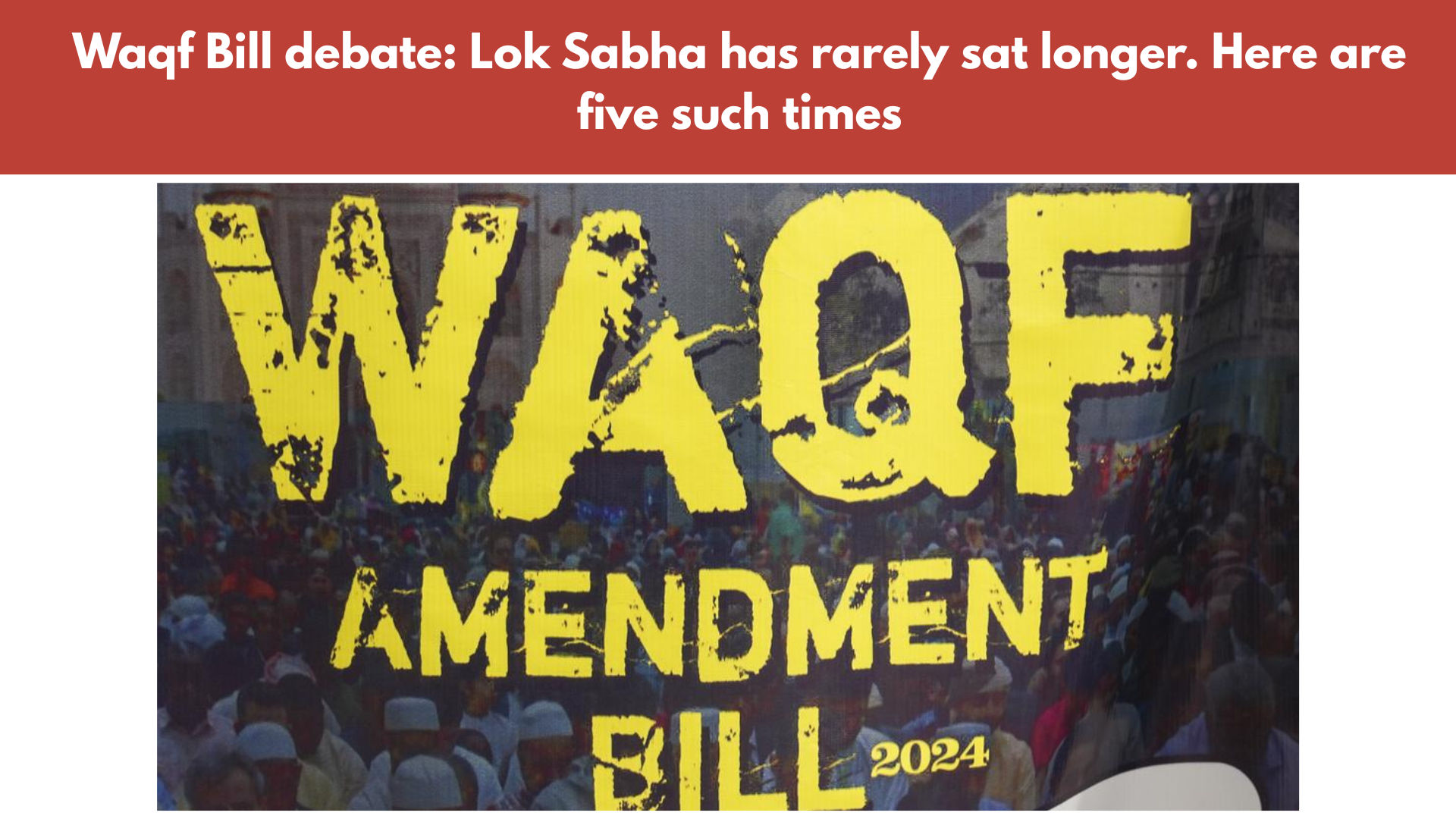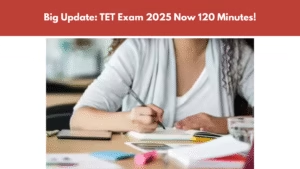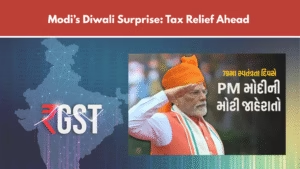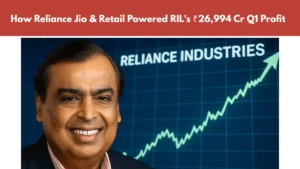Waqf Bill: A Showcase of Democracy’s Strength — And Its Strains :

Waqf Bill
Waqf Bill : Two of the longest discussions are about the Gujarat unrest in 2002 (more than 16 hours) and the 50th anniversary of independence in 1997 (more than 20 hours).
THE DISCUSSION over the Waqf (Amendment) Bill saw the Lok Sabha sit for one of its longest days: 15 hours 41 mins. This included the Question Hour and a discussion on the President’s Rule in Manipur.
The House spent more than 12 hours only discussing the Waqf Bill, beginning at 11 a.m. on Wednesday and ending at 2.40 a.m. on Thursday.

Beginning at 1 pm on Thursday, the Rajya Sabha spent more than 12 hours debating the Waqf Bill. According to parliamentary records, this was the second-longest Rajya Sabha session, according to PTI. On September 17, 1981, the Rajya Sabha had its longest-ever session, deliberating and passing the Essential Services Maintenance Bill, 1981 until 4.43 am the following day. The House then convened till 1:52 am on May 8, 1986, to discuss and approve the Muslim Women (Protection of Rights on Divorce) Bill, 1986.
According to data gathered by PRS Legislative Research, the Lok Sabha has hardly ever convened for longer sessions. Some of these instances include marking the 50th anniversary of independence, discussing the 2002 Gujarat violence, discussing the Essential Services Maintenance Bill, and twice discussing the Railway Budget.
1997: A special session marking the 50th anniversary of independence
Beginning at 11:08 a.m. on August 30 and ending at 8:24 a.m. on August 31,
20 hours and 8 minutes in total (including intermissions)
A special session to commemorate the 50th anniversary of Indian independence included this sitting. At the time, I K Gujral led a 13-party United Front administration.(Waqf Bill)
This was the first time that a special Session of the House was convened to deliberate exclusively on a single motion, which was introduced by Atal Bihari Vajpayee, then the Leader of Opposition in the Lok Sabha, on “the state of democracy and democratic institutions, economic situation, position of infrastructure, achievements and potential in the field of science and technology and the state of human development in the country”.
The House debated the measure for a total of 64 hours and 29 minutes.(Waqf Bill)
Vajpayee spent a significant portion of his address discussing “the criminalization of politics.” “Can we contest and win elections without black money?” he said in reference to rising election costs. Maybe this group will only include a small number of persons.
A corpus amount that might be used by parties for election purposes was proposed by the BJP leader in the budget.
MPs covered a wide range of subjects when the floor opened for discussion, including caste, education for women, rural development, disarmament, the economy, agriculture, and foreign policy.(Waqf Bill)
1993: Railway Budget
Sitting starts 11:01 am, March 30; ends 6:25 am, March 31
Total hours: 18 hours, 25 minutes (including adjournments in between)
K C Lenka, a Rajya Sabha MP, was the Railway Minister then under the Congress-led minority government of PV Narasimha Rao. The sitting dragged on as the Lok Sabha discussed a range of amendments.
The House debated the measure for a total of 64 hours and 29 minutes.(Waqf Bill)
Vajpayee spent a significant portion of his address discussing “the criminalization of politics.” “Can we contest and win elections without black money?” he said in reference to rising election costs. Maybe this group will only include a small number of persons.

A corpus amount that might be used by parties for election purposes was proposed by the BJP leader in the budget.
MPs covered a wide range of subjects when the floor opened for discussion, including caste, education for women, rural development, disarmament, the economy, agriculture, and foreign policy.
Sitting starts 11:00 am, June 8; ends 6:04 am June 9
Total: 18 hours, 4 minutes (including adjournments in between)
The JD(U) leader Nitish Kumar served as the Railways Minister in the NDA coalition government led by Atal Behari Vajpayee at the time. A number of the Budget’s provisions and modifications were reviewed and debated in this instance as well, which resulted in the lengthy sitting
2002: Post-Godhra riots :
Sitting begins on April 30 at 11:00 am and ends on May 1 at 4:25 am.
17 hours, 25 minutes in total (including intermissions)
The Lok Sabha discussed a motion “expressing grave concern over the failure of the administration in ensuring security of the minority community in various parts of the country, specially in Gujarat” following the 2002 Gujarat riots, which took place during the Vajpayee government at the federal level.(Waqf Bill)
Mulayam Singh Yadav, a former MP for Sambhal and the head of the late Samajwadi Party, opened the discussion by saying that the House “requests the government to restore confidence (among) the minority communities and to take steps to provide protection to them.”(Waqf Bill)
Yadav maintained that the atrocities against these people in Gujarat were “also the fault of the Union government.” It’s true that 10%–15% of the victims were Hindus, but 80%–85% of them were Muslims, and they included raping women and girls on the streets, as well as burning their factories and stores. Gujarat is on fire. Does this not demonstrate the Union government’s incapacity? Is this not the responsibility of the government?
Following Yadav, Uma Bharti, the BJP’s representative for the Bhopal Lok Sabha seat, said that she had travelled with Prime Minister Vajpayee to Gujarat following the riots and that he was “disturbed by the state of affairs in Gujarat and had expressed that he felt ashamed… and unable to face the world.”
From sources :
“The ruthless murders of defenseless Hindus are not condemned in plain and straightforward terms, but qualified with all sorts of ifs and buts,” Bharti remarked, bringing up the deaths in the Godhra train fire at the same time. Thus, the Hindu in this nation is forced to believe that their murder will not be categorically denounced.
Bharti talked praised then Gujarat Chief Minister Narendra Modi’s efforts to “bring normalcy” to the state when she returned later, after the controversy surrounding her Godhra comments had subsided.
There was “only one FIR lodged in all of Gujarat on a complaint of rape,” according to Sonia Gandhi, the Congress president and Rae Bareli MP at the time.
Omar Abdullah, the MP for Srinagar, spoke on behalf of the Jammu and Kashmir National Conference, which was then a part of the NDA, and stated that the country’s minorities hoped for a response and a guarantee that events like Godhra and Gujarat would not happen again.
Nobody in their right mind can defend the murders of those innocent individuals who were burned to death in the train in Godhra. No one or any religion can defend it. However, to attempt to defend the deaths of
According to official statistics, over 800 people have been involved in riots since Godhra, which is equally abhorrent, Omar stated.(Waqf Bill)
Union Home Minister L K Advani described the events in Gujarat as a “matter of regret” and praised the NDA government’s “track record” of reducing intercommunal violence.

Modi’s resignation as chief minister, as demanded by certain House members, “is not the solution of the problem,” according to Advani. “We want to take strong action against every criminal, whether they are Muslim or Hindu, in order to solve the problem, which can only be done at the security level,” he stated.(Waqf Bill)
“There is an accusation that I criticize Islamic fundamentalism, but not Hindu fundamentalism,” Vajpayee stated. “… I have consistently performed these actions at difficult times in order to encourage the nation to follow a liberal and peaceful course. This is what Indian culture is trying to say. These accusations are being made now in an effort to damage my reputation,” he stated.(Waqf Bill)
At 4.25 am, when the debate came to a conclusion, Mulayam Yadav stated that he was “expecting” the Prime Minister and Home Minister to discuss the matter further.
With 182 votes in favor and 276 against, the motion was denied.
1981: Essential Services Maintenance Bill
Sitting begins on September 15 at 11:00 am and ends on September 16 at 3:58 am.
16 hours, 58 minutes in total (including intermissions)
This was during the reign of a victorious Indira Gandhi, who had regained power following the dissolution of the Janata Party, which had united against her during the Emergency. The Center can forbid strikes in specific vocations “if the Central Government is satisfied that, in the public interest, it is necessary or expedient to do so,” according to the Essential Services Maintenance Act. According to the Act, the government could put the Act into effect “by general or special order.”
The Act stated that anybody “who initiates a strike which is illegal under this Act,” “participates in any such strike,” or “instigates or incites” a strike would be “liable to disciplinary action.”
Before the Bill became law, it was voted on in a “marathon” with “the Opposition fought the measure all the way,” according to a report from the Indian Express at the time.

After a 14-day protest period spanning three days, the House previously agreed to take up the Bill for discussion. Prior to the second stage, a statutory resolution that sought condemnation of the ordinance that the bill aims to replace was defeated by the House by 216 votes to 69. With more than 500 amendments, the opposition compelled the House to repeatedly split for an hour in order to determine whether or not to discuss the clauses. After 40 minutes, the opposition’s attempt to block the strike ban’s expansion to include a wide range of public and private sector companies was unsuccessful.
According to the report, Home Minister Giani Zail Singh mocked the opposition modifications, calling them “reasonable but not acceptable.”




